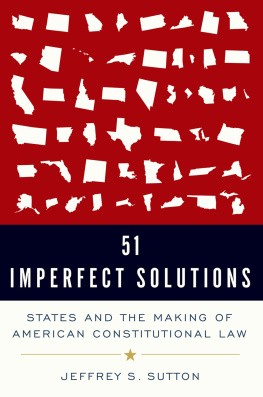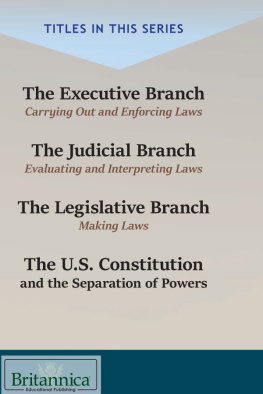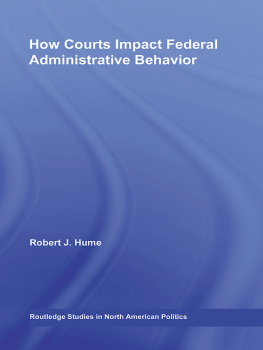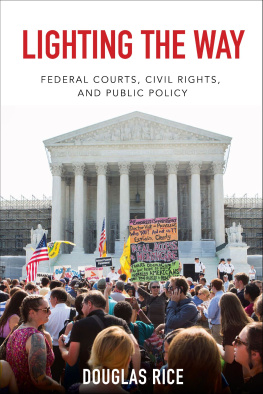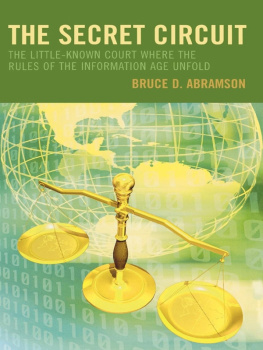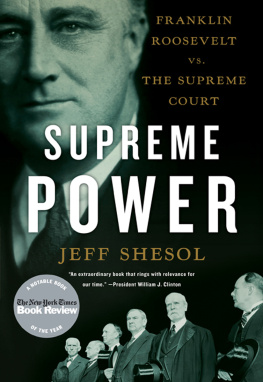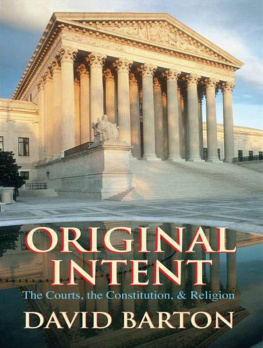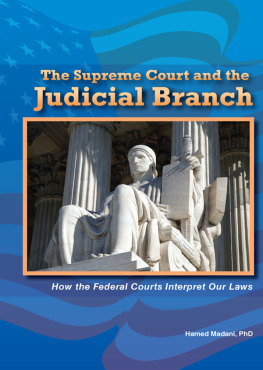Injustice on Appeal
INJUSTICE ON APPEAL
The United States Courts of Appeals in Crisis
William M. Richman
Distinguished University Professor of Law
The University of Toledo College of Law
William L. Reynolds
Jacob A. France Professor of Judicial Process
University of Maryland Francis King Carey School of Law


Oxford University Press is a department of the University of Oxford. It furthers the Universitys objective
of excellence in research, scholarship, and education by publishing worldwide.
Oxford New York
Auckland Cape Town Dar es Salaam Hong Kong Karachi Kuala Lumpur Madrid
Melbourne Mexico City Nairobi New Delhi Shanghai Taipei Toronto
With offices in
Argentina Austria Brazil Chile Czech Republic France Greece Guatemala Hungary
Italy Japan Poland Portugal Singapore South Korea Switzerland Thailand
Turkey Ukraine Vietnam
Oxford is a registered trade mark of Oxford University Press in the UK and certain other countries.
Published in the United States of America by
Oxford University Press
198 Madison Avenue, New York, NY 10016
Oxford University Press 2013
All rights reserved. No part of this publication may be reproduced, stored in a retrieval system, or
transmitted, in any form or by any means, without the prior permission in writing of Oxford University
Press, or as expressly permitted by law, by license, or under terms agreed with the appropriate
reproduction rights organization. Inquiries concerning reproduction outside the scope of the above should
be sent to the Rights Department, Oxford University Press, at the address above.
You must not circulate this work in any other form
and you must impose this same condition on any acquirer.
Library of Congress Cataloging-in-Publication Data
Richman, William M.
Injustice on appeal : The United States Courts of Appeals in Crisis / William M. Richman,
William L. Reynolds.
p. cm.
Includes bibliographical references and index.
ISBN 978-0-19-534207-9 ((hardback) : alk. paper)
1. Appellate courtsUnited States. 2. Appellate procedureUnited States.
I. Reynolds, William L., 1945- II. Title.
KF8750.R53 2013
347.738dc23
2012022806
9 8 7 6 5 4 3 2 1
Printed in the United States of America on acid-free paper
Note to Readers
This publication is designed to provide accurate and authoritative information in regard to the subject matter covered. It is based upon sources believed to be accurate and reliable and is intended to be current as of the time it was written. It is sold with the understanding that the publisher is not engaged in rendering legal, accounting, or other professional services. If legal advice or other expert assistance is required, the services of a competent professional person should be sought. Also, to confirm that the information has not been affected or changed by recent developments, traditional legal research techniques should be used, including checking primary sources where appropriate.
(Based on the Declaration of Principles jointly adopted by a Committee of the
American Bar Association and a Committee of Publishers and Associations.)
You may order this or any other Oxford University Press publication
by visiting the Oxford University Press website at www.oup.com
For Carol, for always.
W.M.R.
To my children, Bill, Megan, and Sarah
W.L.R.
CONTENTS
This book examines the background and consequences of shortcuts in case processing adopted by the federal circuit courts over the past forty years. These shortcuts, which we call collectively Appellate Triage, include unpublished opinions that lack precedential value and that could not be cited (until 2006); reduction in the frequency of oral argument; and the delegation of great quantities of decision-making authority to central staff. Today, the vast majority of cases resolved by the circuit courts are decided using those shortcuts. The burden of those changes has fallen largely on the disfavored in our society.
We began writing in this area more than a third of a century ago. We started by examining unpublished opinions, their nonprecedential status, and the prohibitions on citation to them. Soon, we realized that the problem also included the elimination of oral argument and the growth of central staff. We then wondered why the obvious solution to the caseload problemmore judgeshad not been adopted. That led us to examine the judges arguments for their refusal to ask Congress for additional judgeships and the reasons they have systematically discounted the large body of empirical evidence that refutes those arguments. More recently we began to notice that the judges, having succeeded in restricting the size of the bench, have ceased even to discuss the issue in public. Our thirty-plus years of study have left us with anger and despair over the creation and jealous maintenance of a system that underserves the nation and shortchanges the poor and powerless.
We thank both of our schools for generously supporting our work on this book and the studies that preceded it. That support has been both intangible and tangible, with the latter in the form of research grants and research assistance. We are also grateful to the many scholars and judges around the country who have contributed to the body of commentary in the area; many of them have also have had kind words to say of our work.
Special thanks to Susan McCarty, Senior Research Librarian at the University of Maryland School of Law for her splendid editorial assistance, and to Yvonne McMorris, also of Maryland, for her cheerful and patient assistance. Also thanks to University of Toledo College of Law students, Wyatt Holliday, Sydney Leavitt, and Michelle Tussing, for valuable help in the final stages of preparation of the book, and to Diane Bohn for patient administrative assistance. We are grateful, as well, to our editors at Oxford University Press for their patience and support. Finally, we express our gratitude to our families for their patient encouragement and support during the preparation of this book and the thirty-some years of study that preceded it.
This book treats a metamorphosisactually, a deteriorationof one of the nations great legal institutions, the United States Circuit Courts of Appeals. These courts hear appeals from the United States District Courts, and they are reviewed in turn only by the Supreme Court, at its discretion by writ of certiorari. The courts are organized into twelve geographic circuits and one specialty circuit (the Federal Circuit).
The importance of these courts would be hard to overstate. They decide over fifty thousand cases per year, out of which the Supreme Court usually chooses to review fewer than one hundred. From the litigants point of view, the decisions of the Courts of Appeals are, for all practical purposes, finalthe last stop in the judicial system. The Courts of Appeals are also important from the point of view of the laws development and for the same reason. The Supreme Court hears so few casesand they typically deal only with questions having important public policy implicationsthat the Courts of Appeals supply the definitive answer to the vast majority of the nations legal questions. Thus, for nearly all constitutional and federal statutory issues, all questions dealing with the jurisdiction of the federal courts and the interpretation of the Federal Rules of Evidence and the Federal Rules of Civil, Criminal, and Appellate Procedure as well as all issues dealing with judicial authority over the vast administrative machinery of the federal and state governments, the courts of appeals supply the last word.
Next page

